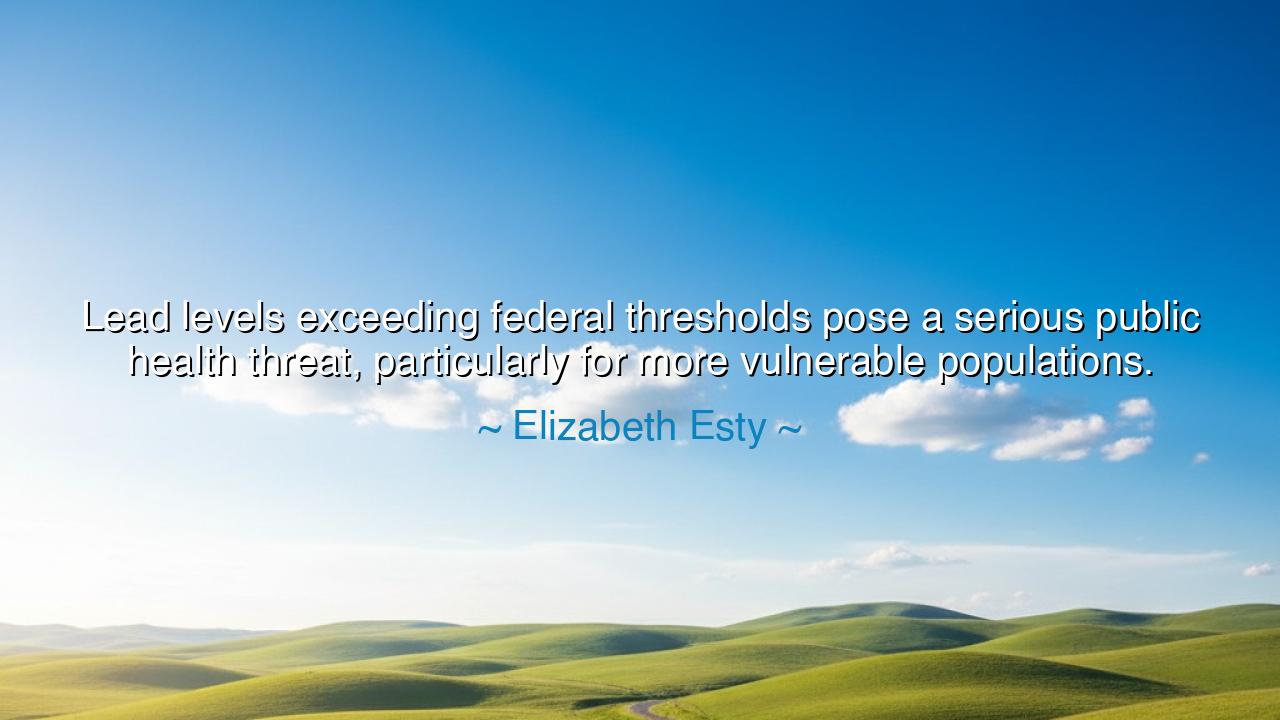
Lead levels exceeding federal thresholds pose a serious public
Lead levels exceeding federal thresholds pose a serious public health threat, particularly for more vulnerable populations.






In an age where progress has clothed itself in steel and concrete, Elizabeth Esty spoke words that pierce the armor of complacency: “Lead levels exceeding federal thresholds pose a serious public health threat, particularly for more vulnerable populations.” To some, it may sound like the language of science or policy—but beneath it lies a truth as old as civilization itself: when the guardians of a nation neglect the purity of its water, its air, and its earth, they betray the lifeblood of their people. These words are not merely technical—they are a warning, a lament, and a call to awaken from the slumber of indifference.
The poison of lead, invisible yet insidious, has long been a silent enemy of humankind. It seeps not with the roar of a storm, but with the slow persistence of decay. Once hailed as a gift of industry—a metal that made pipes stronger, paint brighter, and fuel more powerful—it revealed itself, in time, to be a curse. Esty’s quote reminds us that the line between innovation and destruction is perilously thin, and that every advancement carries a moral burden. What profits a nation to build its cities swiftly if, in the process, it poisons its children?
The ancients themselves knew the peril, though they could not name it as we do. In the days of the Roman Empire, the aqueducts that brought water to the heart of Rome flowed through pipes lined with lead. The emperors bathed in luxury, the nobles drank from crystal cups—but the water that sustained them carried death. Historians have long pondered whether the decline of Rome was hastened by this silent toxin. The people’s minds grew dull, their bodies weak, their lineage corrupted by the very material that built their civilization. Thus, Esty’s words echo through centuries: prosperity without wisdom becomes poison.
And so, too, in our own age, have we witnessed tragedy born of negligence. In Flint, Michigan, the people drank from their taps believing their leaders had safeguarded their health. But the water that flowed into their homes carried lead levels far beyond safety, and the children—the most vulnerable population—suffered most. Their small bodies bore the burden of toxins, their futures shadowed by choices they never made. The lesson of Flint, like that of Rome, is eternal: when power forgets compassion, when governance forgets vigilance, suffering seeps into every household, unseen but unrelenting.
Esty’s warning calls us to remember that public health is not a matter of convenience or cost—it is the foundation of civilization itself. A society that cannot provide safe water, clean air, and wholesome food for its people has already begun to rot from within. The measure of a nation’s greatness is not the height of its towers or the reach of its armies, but the well-being of its most fragile citizens—the child, the elder, the poor. For in their safety lies the measure of justice; in their sickness lies the measure of neglect.
Yet the quote also carries a note of hope, for it reminds us that awareness is the first step toward renewal. When truth is spoken—when someone like Esty raises her voice—the poison can no longer hide. Knowledge becomes the beginning of healing. Communities can demand action, scientists can expose corruption, and people can unite in defense of the earth that sustains them. Just as fire purifies metal, truth purifies society—but only if it is heeded, only if it burns away the apathy that allows danger to thrive.
Let this, then, be the wisdom we pass down: heed the small warnings before they become great disasters. Protect what cannot protect itself. Test the water you drink, the soil you till, the air you breathe—and not only for yourself, but for those who will come after you. For every child born into this world inherits not only its light, but its toxins; not only its beauty, but its burden. To ensure that inheritance is pure is the sacred duty of all who live.
Therefore, let us be as the watchmen of old—ever vigilant, ever compassionate. Let us demand that public health be treated not as policy, but as covenant. And may the words of Elizabeth Esty remind us that progress without responsibility is decay disguised as triumph, and that the truest form of leadership is not in building monuments of power, but in protecting the quiet breath of the innocent.






AAdministratorAdministrator
Welcome, honored guests. Please leave a comment, we will respond soon